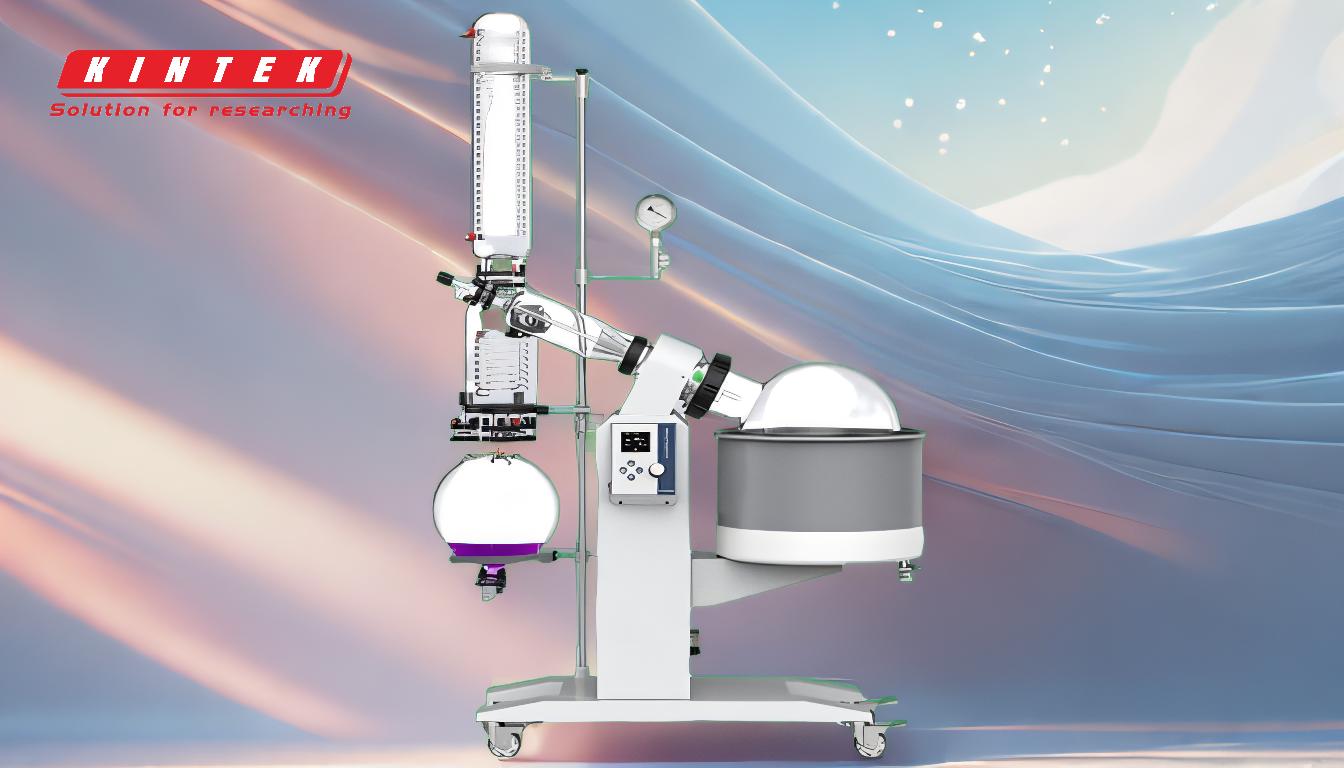Yes, a rotary evaporator can effectively remove ethanol from a mixture. Rotary evaporators are specifically designed to remove solvents like ethanol by lowering the pressure inside the apparatus, which reduces the boiling point of the solvent. This allows ethanol to evaporate at a much lower temperature than its standard boiling point, minimizing the risk of thermal decomposition of the sample. The process involves rotating the flask to increase the surface area for evaporation, condensing the ethanol vapor, and collecting it in a separate flask. This method is efficient, gentle, and widely used in laboratories for solvent removal.
Key Points Explained:

-
How a Rotary Evaporator Works:
- A rotary evaporator operates by reducing the pressure inside the system, which lowers the boiling point of the solvent (in this case, ethanol).
- The mixture containing ethanol is placed in a round-bottomed flask, which is rotated and immersed in a temperature-controlled water bath. The rotation increases the surface area of the liquid, accelerating evaporation.
- The ethanol vapor is then condensed using a water condenser and collected in a receiving flask, leaving the concentrated sample behind.
-
Optimal Conditions for Ethanol Removal:
- Ethanol can be removed at lower temperatures due to the reduced pressure. For example:
- At 30°C, ethanol boils at 123 mbar.
- At 25°C, ethanol boils at 95 mbar.
- The 20/40/60 rule is often applied:
- The water bath temperature is set about 20°C higher than the desired vapor temperature.
- The condenser temperature is set about 20°C lower than the vapor temperature.
- For ethanol, the chiller is typically set to around 0°C, and the bath temperature is set to about 50°C.
- Ethanol can be removed at lower temperatures due to the reduced pressure. For example:
-
Advantages of Using a Rotary Evaporator for Ethanol Removal:
- Gentle Process: The reduced pressure and lower temperatures prevent thermal decomposition of sensitive compounds.
- Efficiency: The rotation of the flask creates a thin film of liquid, speeding up evaporation.
- Versatility: Rotary evaporators can handle a wide range of solvent volumes, up to 3 liters, making them suitable for both small and large-scale applications.
-
Steps to Remove Ethanol Using a Rotary Evaporator:
- Place the ethanol-containing mixture in a round-bottomed flask.
- Set the water bath temperature to around 50°C.
- Set the condenser chiller to approximately 0°C.
- Apply a vacuum to reduce the pressure to the desired level (e.g., 95–123 mbar for ethanol).
- Rotate the flask to create a thin film of the mixture, promoting rapid evaporation.
- Collect the condensed ethanol in the receiving flask.
-
Applications of Rotary Evaporators in Ethanol Removal:
- Organic Chemistry: Commonly used to separate ethanol from reaction mixtures.
- Aroma Extraction: Ideal for extracting delicate aroma compounds without exposing them to high heat.
- Concentration of Samples: Used to concentrate samples by removing ethanol or other solvents.
-
Considerations for Effective Ethanol Removal:
- Ensure the vacuum system is properly sealed to maintain the required pressure.
- Monitor the bath and condenser temperatures to prevent overheating or incomplete condensation.
- Use appropriate flask sizes to avoid overfilling, which can reduce evaporation efficiency.
By following these guidelines, a rotary evaporator can efficiently and safely remove ethanol from a mixture, making it an indispensable tool in laboratories for solvent separation and sample concentration.
Summary Table:
| Key Aspect | Details |
|---|---|
| How It Works | Reduces pressure to lower ethanol's boiling point, enabling low-temperature evaporation. |
| Optimal Conditions | - 30°C at 123 mbar |
- 25°C at 95 mbar
- Follows the 20/40/60 rule for temperature settings. | | Advantages | - Gentle on sensitive compounds
- High evaporation efficiency
- Handles up to 3 liters of solvent. | | Steps for Ethanol Removal | 1. Set water bath to 50°C
- Set condenser to 0°C
- Apply vacuum (95–123 mbar)
- Rotate flask for rapid evaporation. | | Applications | - Organic chemistry
- Aroma extraction
- Sample concentration. | | Considerations | - Ensure proper vacuum sealing
- Monitor temperatures
- Use appropriate flask sizes. |
Need help removing ethanol from your mixture? Contact our experts today for personalized advice!











